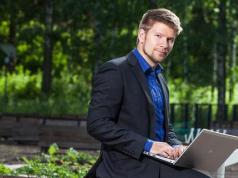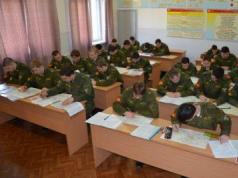"PhD" - academic degree. It has existed in Russia and the CIS countries since the times Soviet Union- since 1934. This is an intermediate step on the scientific path from Master to Doctor of Science and is awarded to an applicant who:
- has higher education;
- passed all candidate exams;
- carried out a number of studies on his topic;
- presented and proved the novelty and practical value of scientific ideas;
- passed the procedure in accordance with the requirements established by law.
The Russian academic degree “Candidate of Sciences” is an analogue of the Western PhD (read as pi-eych-di). PhD - Doctor of Philosophy. However, in essence it is not identical to the degree in Russia. The latter assumes an even higher level of results

The degree "PhD" is differentiated depending on the specialty in which the applicant can defend his work. In Russia there are 23 branches for awarding such titles. For example: candidate of physical and mathematical sciences, candidate of philological sciences. But there are a lot of specialties. You can be a candidate in legal, veterinary, biological, military, geological-mineralogical, geographical, historical, pedagogical, political, medical, psychological, sociological, technical, pharmaceutical, philosophical, agricultural, chemical, economic sciences. In addition, there is such a title as candidate of architecture, art history, cultural studies.

The degree "Candidate of Philosophy" should not be confused with the Western interpretation mentioned above - Doctor of Philosophy (PhD).
When following the scientific path, the applicant must understand the goal for which he is willing to go through a lot of work. difficult stages to obtain a PhD degree. It is worth understanding that this title is not a guarantee of great material goods in future. At least the return won't be quick. At first, this is an increase of about 10-15% of the salary. It is appropriate and truly significant for further study at a university, participation in a competition for the scientific title of associate professor or professor, or work at the department.

Writing a dissertation is a complex, painstaking, multi-step process. First of all, it is necessary to create a new, original intellectual product - the result scientific activity. Next, you should organize the protection process. There are usually many people involved: scientific adviser, opponents, experts, reviewers, editors, consultants, etc. It is important to note that having decided to engage in science, you need to be prepared to some extent for material investments. We are in no way talking about purchasing and not independently performing specific stages of work.
However, often conducting real large-scale research that would be truly beneficial and have practical significance requires certain resources. For example, conducting experiments, experiments, by their very methodology, can be expensive.
It's no secret that organizational issues related to the protection measures itself, especially in the final period, may also require some financial investments. However, everything here is very individual, depending on the established traditions of the university, the council, and circumstances.
It is generally accepted that a doctor who has a degree of candidate or doctor of medical sciences (candidate of medical sciences or doctor of medical sciences) is by default a professional high level. However, when choosing an attending physician, it is worth, if possible, to clarify the research topic on which the doctor is currently working, or within the framework of which his dissertation was defended. Sometimes there are situations when the period of active scientific activity of a doctor occurred in the last years of study at a university, and an academic degree was awarded for merits in the theoretical, rather than in the practical branch of medicine.
It’s another matter if the doctor is currently actively researching exactly that narrow area of medicine to which your disease is related. For example, if you suffer from severe psoriasis, you may benefit from consulting a dermatology expert who specializes in treating this disease. In addition, it is worth keeping in mind that physician-scientists, as a rule, combine practical activities with teaching at a university, and, therefore, constantly enrich and improve their knowledge.
The presence of scientific publications, rationalization proposals, patents and, in particular, a candidate’s or doctoral dissertation from a doctor are confirmation of his high intelligence and ability to work organized and hard. In addition, specialists who have completed postgraduate training in mandatory take philosophy courses, in English, medical statistics, which means they have a broader outlook on life and have the opportunity to keep abreast of the latest scientific discoveries and developments.
All of the above suggests that there are objective reasons to expect a higher qualification of a doctor with an academic degree. However, there is no guarantee that such a doctor will be able to solve medical problem, which will be too tough for an “ordinary” specialist, does not exist. Thus, on recommendation services there are negative reviews addressed to the work of both candidates and doctors of medical sciences.
If you have serious disease or complex diagnostic case, then you should definitely aim to find a doctor with a degree. In other situations, this factor is unlikely to play a decisive role.
Candidate of Medical Sciences, Associate Professor
Education
- 1997 - Graduated from Tver State Medical Academy.
Postgraduate education
- 1999 - graduated from clinical residency at the Department of Skin and Venereal Diseases of the Tver State Medical Academy.
- Completed training in endoscopic diagnostics urological diseases, laser-physiotherapy, phototherapy of dermatoses, radio wave surgery of skin tumors, dermatocosmetology, clinical andrology.
- 2013 - received a certificate in andrology, Intituto De Medicina Sexual, Madrid.
- 2014 - advanced training in dermatovenerology, Medical Institute for Advanced Training of Physicians of the Federal State Budgetary Educational Institution of Higher Professional Education "MSUPP".
Areas of work of the specialist
- Conducting dermatological, venereological and urological appointments
(with all manipulations) - All types of urethroscopy (dry and irrigation)
- Dermatoscopy
- Skin ultrasound
- Colposcopy
- All types of physical and laser therapy for skin, urological and
gynecological diseases - Radio wave surgery in full
- PUVA therapy and selective phototherapy
- Excimer laser therapy
Specialization
- Diseases of the skin and nails in adults and children;
- Viral diseases skin (herpes, papilloma viral infection,
molluscum contagiosum); - Allergic dermatoses (eczema, neurodermatitis);
- Papular dermatoses (psoriasis, parapsoriasis, red lichen planus,
lichen Devergie); - Fungal diseases skin and nails in adults and children;
- Pustular skin diseases (pyoderma, boils, furunculosis);
- Skin neoplasms (nevi, moles, papillomas, hemangiomas, basal cell carcinomas, genital warts, keratomas, atheromas, fibromas);
- Sexually transmitted infections (STIs);
- Urogenital papilloma-viral infection (genital warts);
- Urethritis, colliculitis;
- Cystitis;
- Chronic prostatitis;
- Adenoma prostate gland;
- Male infertility;
- Erectile dysfunction (impotence);
- Ejaculation disorders (ejaculation);
- Pelvic pain.
Professional experience (career)
GRIGORYEVA Marina Nikolaevna
Candidate of Medical Sciences, Associate Professor of the Department of Childhood Diseases
In 1995, she graduated from the Chuvash State University named after I.N. Ulyanov, majoring in Pediatrics. From 1996 to 2000, she studied at the clinical residency at the Chuvash State University named after I.N. Ulyanov, from 2000 to 2002 – in full-time postgraduate study at the Department of Childhood Diseases under the guidance of Doctor of Medical Sciences, Professor M.V. Krasnova.
Academic degree and academic title: Candidate of Medical Sciences (2002), Associate Professor (2011).
PhD thesis
Subject “Health and development of children in industrial cities of the iodine-deficient region.”
Place of defense: Scientific Center for Children's Health of the Russian Academy of Medical Sciences, Moscow, year of thesis defense– 2002, scientific specialty 14.00.09: Pediatrics, scientific supervisor – Doctor of Medical Sciences, Professor V.M. Krasnov.
Labor activity
After defending her PhD thesis, she worked at the Department of Childhood Diseases of the Chuvash state university named after I.N. Ulyanov as an assistant of the department from 2002 to 2005, as an associate professor of the department - since 2005.
Main directions of scientific activity
Scientific research is devoted to the problem of iodine deficiency and the organization of prevention of iodine deficiency diseases. The value of the research results lies in the fact that it developed new regional standards for anthropometric indicators. Proven Negative influence combined iodine deficiency and anthropogenic pollution on somatic health, physical, sexual and intellectual development. A complex of medical-biological, socio-economic and other factors determining the level of health of the child population in a region with iodine deficiency with different anthropogenic loads has been established, and the degree of risk has been assessed.
Based on the conducted research, scientifically based recommendations have been developed for the prevention of health disorders, growth and development of children living in an iodine-deficient region.
Has more than 35 publications, of which 16 educational and methodological and 20 scientific works,used in teaching practice.
The most significant publications:
Hereditary diseases // Epidemiology and ethno-territorial features of hereditary diseases in children of the Chuvash Republic. Moscow: Publishing house. House "New Textbook", 2009. P.5-124
Hereditary metabolic diseases // Hereditary diseases in children of the Chuvash Republic. Cheboksary, 2009. P.70-85.
Grade physical development schoolchildren of the city of Cheboksary.
Actual problems pediatrics. MaterialsXVI Congress of Pediatricians of Russia. Moscow, 2009.
Dependence of intellectual indicators of urban schoolchildren on school specialization and age // Current problems of pediatrics. Mat.XVI Congress of Pediatricians of Russia
Specialization and experience
In 1969 she graduated from the medical faculty of the 2nd Moscow Order of Lenin State Medical Institute named after N.I. Pirogov,
In 1971 - clinical residency in dermatovenerology at the department of skin and venereal diseases.
In 1974 - postgraduate study at the same department, after which she defended her Ph.D. thesis To the study of allergic reactivity and the content of some biogenic amines in patients with urticaria and prurigo during histaglobulin therapy.
Since 1974 I have been working at the Department of Skin and Venereal Diseases of the Moscow State Medical University, currently as head educational part Faculty of Postgraduate Education.
In 2002, she completed courses on laser therapy in gynecology and dermatovenereology at the Department of Obstetrics and Gynecology at Moscow State Medical University, and mastered methods of working with various lasers.
For 15 years, Vasilenko T.I. works as a consultant in the clinic of the KhF of the RSFSR. Since 1994, Tatyana Ivanovna has also been consulting in the venereology department of KVKD No. 8 in Moscow.
Indispensable participation in scientific and practical conferences, held on the basis of a number of Moscow dermatovenerological dispensaries, symposia, conventions and congresses on dermatovenerology allows Tatyana Ivanovna Vasilenko to systematically improve her qualifications.
Scientific and professional achievements
Scientific activities are carried out in different directions. The main one is improvement modern methods diagnosis and treatment various forms syphilis, papillomavirus and herpetic infection. This includes the use of infrared destructive laser for the treatment of PVI - as the most promising local method of treating this infection.
Tatyana Ivanovna successfully applies various methods complex treatment papillomavirus infection, genital herpes, benign neoplasms skin, prostatitis. The method of thermoelectrocoagulation, cryotherapy and cryodestruction is widely used.
Word to the doctor
What difficulties does a doctor in your specialty encounter?
T.I.: Ignorance or inaccessibility of modern methods for diagnosing sexually transmitted infections often leads to failure to recognize the disease. Diseases turn into chronic form. Often the patient remains unsanitized, which can subsequently lead to infertility, frigidity, and impotence.
On the other hand, overdiagnosis is possible - identifying non-existent diseases, and, accordingly, prescribing incompetent treatment.
A dermatovenerologist must be a thinking doctor, constantly improve his professional level, have intuition, patience and tact in communicating with patients and do everything possible to improve the condition of his patients.
A doctor of our specialty must not forget that there are only two true skin diseases; all the other 3000 nosological forms have unclear etiology and pathogenesis, which makes it extremely difficult to diagnose and, even more so, treat a dermatological patient.
The doctor should not harm the patient.
What do you want to tell your patients?
T.I.: If you have chosen your doctor, you must trust him and strictly adhere to his recommendations. Do not self-medicate.








